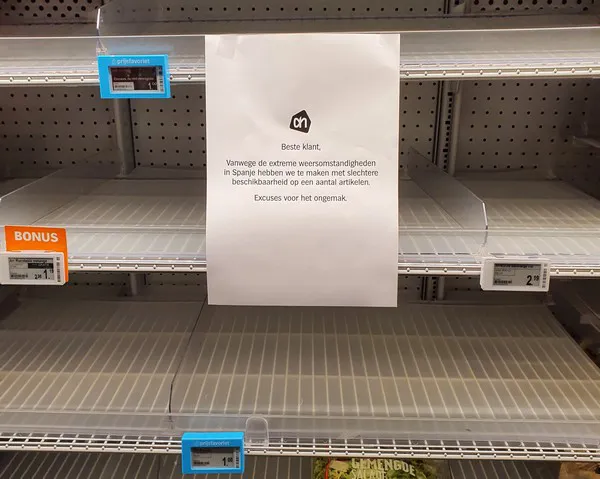Extreme winter weather, with unprecedentedly low temperatures, hit Spain recently. Some areas of the country got a lot of snow too. This disrupted various types of vegetables' production. It's also caused market shortages of certain products.

Empty shelves at Albert Heijn in the Netherlands
Colruyt, a Belgian supermarket chain, is experiencing delayed suppliers of some vegetables. This is a result of the Spanish cold front. "It's currently difficult to get courgettes, aubergines, bell peppers, tomatoes, broccoli, and cauliflower," says Hanne Poppe from Colruyt. "We get most of our vegetables from the Murcia and Almeria areas."
"It didn't snow there, but it was bitterly cold and frosty. That slowed down the vegetables' growth. Heavy rain followed the cold snap, so farmers couldn't harvest their crops. The rest of the country had heavy snowfall too. That created intermittent transportation problems."
“It's challenging to get enough quality products at the moment, but we're coping. Thanks to our buyers' contracts we can still offer people sufficient products. We source Italian vegetables too. Currently, there aren't any significant problems or structural shortages. So, we don't have big gaps on our shelves," explains Hanne. "We don't expect any in the coming days either. We think the situation should normalize this week. The Spanish cultivation areas are having considerably better weather."
“But prices are much higher. We're price followers, so adhere to standard market prices. And adjust our price accordingly. We have large volumes to move. We have worked at communicating this transparently to our shoppers. For example, we have posters in the fresh produce section. These indicate that there might be less supply of certain vegetables. That's due to the bad weather in Spain. In this way, we make the situation clear to our customers," Hanne says.
Carrefour
Carrefour is another Belgian supermarket chain. According to them, the situation has already normalized somewhat. But, they also had to deal with disrupted supplies. "The most affected products were aubergines, courgettes, cucumbers, broccoli, and cauliflower," says Aurelie Gerth of Carrefour. "Our advantage is that we work with seasonal contracts. So the producers prioritized our deliveries. As a result, we've been largely spared major supply problems."
Aldi
Aldi Belgium has some issues too. But according to Fruit and Vegetable Category Manager Kilian De Geyter, it wasn't too bad. "That's thanks to years of partnering with the same suppliers. They, in turn, work with fixed producers. These relationships don't immediately disappear with things get tough. But product prices rise, of course."
"Courgettes, cucumbers, and aubergines are the hardest to come by. We no longer have loose aubergines in our range. And, from next week, also not loose courgettes. There are alternatives from Italy, Morocco, and Egypt. But this isn't always workable. We have specific requirements regarding residues and the number of active substances," says Kilian.
